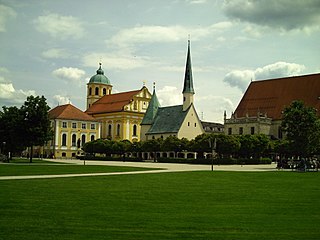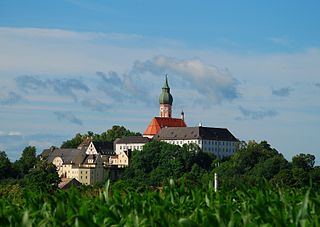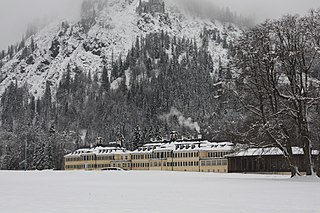
Altötting is a town in Bavaria, capital of the district Altötting of Germany. For 500 years it has been the scene of religious pilgrimages by Catholics in honor of Mary, including a visit by Pope John Paul II in 1980 and one by Pope Benedict XVI in 2006.

The Bayerische Oberlandbahn GmbH (BOB) is a private railway company based in Holzkirchen, Germany, and owned by Transdev Germany. Since June 2020 its services are operated under the brand Bayerische Regiobahn (BRB) of its sister company.

Andechs Abbey is a Benedictine priory in the municipality of Andechs, in the Landkreis of Starnberg, Upper Bavaria, Germany. A place of pilgrimage on a hill east of the Ammersee, the Abbey is famed for its flamboyant Baroque church and its brewery, Klosterbrauerei Andechs, the proceeds from which help fund the monks' mission of help. Composer Carl Orff is buried in the church.

Ettal Abbey is a Benedictine monastery in the village of Ettal close to Oberammergau and Garmisch-Partenkirchen in Bavaria, Germany. With a community of more than 50 monks, with another five at Wechselburg, the Abbey is one of the largest Benedictine houses and is a major attraction for visitors.

Paulaner is a German brewery, established in 1634 in Munich by the Paulaner Order of mendicant friars. Now owned by the Schörghuber family, it is one of the six breweries which provides beer for Oktoberfest. Paulaner ranks number six among Germany's best-selling beers.
Duke in Bavaria was a title used among others since 1506, when primogeniture was established, by all members of the House of Wittelsbach, with the exception of the Duke of Bavaria which began to be a unique position. So reads for instance the full title of the late 16th century's Charles I, Count Palatine of Zweibrücken-Birkenfeld and patriarch of the House of Palatinate-Birkenfeld: "Count Palatine by Rhine, Duke in Bavaria, Count to Veldenz and Sponheim". The title grew in importance as Wilhelm, Count Palatine of Zweibrücken-Birkenfeld-Gelnhausen began to use it, in the early 19th century, as his primary title – Duke Wilhelm in Bavaria. This choice has also had effect for his descendants.

Tegernsee is a town in the Miesbach district of Bavaria, Germany. It is located on the shore of Lake Tegernsee, which is 747 m (2,451 ft) above sea level. A spa town, it is surrounded by an alpine landscape of Upper Bavaria, and has an economy mainly based on tourism.

Ilmmünster Abbey was a collegiate foundation (Kollegiatstift) of canons, formerly a Benedictine monastery, in Ilmmünster, Bavaria, Germany. The church continues in use as a parish church.

Tegernsee Abbey is a former Benedictine monastery in the town and district of Tegernsee in Bavaria. Both the abbey and the town that grew up around it are named after the Tegernsee, the lake on the shores of which they are located. The name is from the Old High German tegarin seo, meaning great lake.

Benediktbeuern Abbey is an institute of the Salesians of Don Bosco, originally a monastery of the Benedictine Order, in Benediktbeuern in Bavaria, near the Kochelsee, 64 km south-south-west of Munich. It is the oldest and one of the most beautiful monasteries in Upper Bavaria. It was badly damaged in an extreme weather event in 2023.

Weltenburg Abbey is a Benedictine monastery in Weltenburg near Kelheim on the Danube in Bavaria, Germany.

Weihenstephan Abbey was a Benedictine monastery in Weihenstephan, now part of the district of Freising, in Bavaria, Germany. Brauerei Weihenstephan, located at the monastery site since at least 1040, is said to be the world's oldest continuously operating brewery.

Břevnov Monastery is a Benedictine archabbey in the Břevnov district of Prague, Czech Republic. It was founded by Saint Adalbert, the second Bishop of Prague, in 993 AD with the support of Bohemian Duke Boleslaus II. The first Benedictine male monastery in Bohemia, it also has the oldest tradition of beer brewing in the Czech Republic. Brewing was interrupted several times in the history, but up to today, the Břevnov Monastery Brewery brew its beer here.
Max-Emanuel Ludwig Maria Herzog in Bayern as the younger son of Albrecht, Duke of Bavaria, is the heir presumptive to both the headship of the former Bavarian royal house and the Jacobite succession.

DukeMaximilian Joseph of Bavaria, known informally as Max in Bayern, was a member of a junior branch of the royal House of Wittelsbach who were Kings of Bavaria, and a promoter of Bavarian folk-music. He is most famous today as the father of Empress Elisabeth of Austria ("Sisi") and great-grandfather of King Leopold III of Belgium.

Kreuth is a municipality and a village in the district of Miesbach in Bavaria in Germany.

Großhesselohe Isartalbahn station is a station on the Isar Valley Railway from Munich to Bichl in the German state of Bavaria. Since 1981, it has been a station of the Munich S-Bahn. The station is located in the municipality of Pullach, which also contains the stations of Pullach and Höllriegelskreuth. It is classified by Deutsche Bahn as a category 5 station and has two platform tracks. The station building is registered as a historic building on the List of Bavarian Monuments.

The König Ludwig GmbH & Co. KG Schlossbrauerei Kaltenberg is a brewery in Fürstenfeldbruck, Upper Bavaria, Germany. Their slogan, "Bier von königlicher Hoheit", or "Beer of royal highness", refers to the brewery's heritage which can be traced back through the Kingdom of Bavaria, long associated with beer and brewing. The current proprietor, Prince Luitpold of the House of Wittelsbach, is the great-grandson of the last King of Bavaria, Ludwig III, and by extent a descendant of the original signatories of the 1516 Bavarian Purity Law, and Ludwig I, whose wedding celebration marked the first Oktoberfest.

The Bayerische Staatsbrauerei Weihenstephan is a German brewery owned by the Free State of Bavaria located on the site of the former monastery Weihenstephan Abbey in Freising, Bavaria. In 2014, the total output was 403,039 hectolitres (343,457 US bbl). The brewery advertises itself as "The World's Oldest Brewery".

The Aldersbach brewery is a traditional medium-sized brewery in Aldersbach, Lower Bavaria, opened in the 13th century. It produces beer types such as Dunkel, Helles, and Pilsner, plus seasonal Bock and Pale lagers. In 2016, it won awards from the Bavarian Brewers Association and the Bavarian State Beer Exhibition.




















